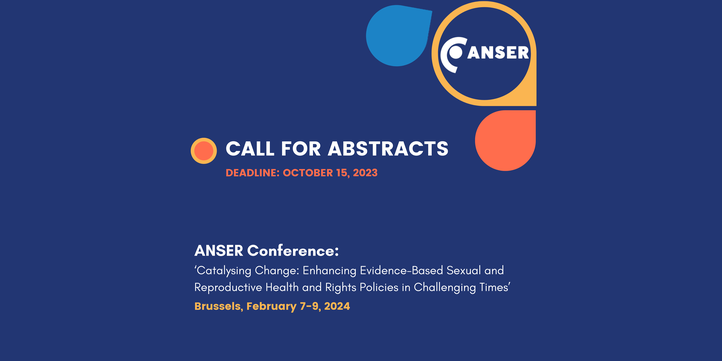Call for Abstracts
Submitting an abstract to ANSER allows you to present your work to a diverse audience of policymakers, academics, NGO representatives and health professionals and to emphasize achievements and remaining gaps in SRHR to shape the ICPD+30 agenda. The selection of abstracts will be done by a review committee of experts.
Abstracts should be submitted via the online form by the 15th of October 2023. You can contact anser@ugent.be for any further questions.
Conference themes
- Breaking barriers: Achieving Equitable Access to Sexual and Reproductive Health Services and medicine within Universal Health Coverage
Many individuals still experience obstacles to accessing comprehensive sexual and reproductive health services and commodities or exercising their rights. These disparities in health care can take many forms, often based on the geographical, economic, social and cultural background of the individual.
Can a comprehensive universal health coverage system that encompasses a wide range of SRHR needs, such as family planning, maternal healthcare, HIV/AIDS prevention and treatment, gender-based violence support, etc, break down the barriers and create a society where everyone has the opportunity to lead a healthy and fulfilling sexual and reproductive life? - Sustainable Futures: Exploring the Intersections of Climate and Sexual and Reproductive Health
There is a growing need to address the interrelation between climate change and sexual and reproductive health if we want to promote sustainable development and improve overall human health and well-being. Climate change can have detrimental effects on sexual and reproductive health and rights: extreme weather events disrupt health facilities, limit access to reproductive health services and supplies, and increase the vulnerability of forcibly displaced people to sexual violence and harmful practices. A crucial task involves developing policies and programmes that anticipate the consequences of recurring climate change-induced emergencies, while also recognizing that sexual and reproductive health services and commodities can serve to enhance people's resilience in the face of environmental changes impacting their livelihoods.
How can we develop comprehensive and effective strategies that address both the challenges of climate change and advance sexual and reproductive health and rights? And what is the place of family planning within our responses? - Innovating for Impact: Unlocking the Potential of Technology in Sexual and Reproductive Health
In today's digital era, technology has the potential to revolutionize SRH by overcoming barriers such as geographical distance, social stigma, and limited resources. From mobile applications that inform on contraception and pregnancy tracking to telemedicine platforms that enable remote consultations with healthcare professionals, technology offers innovative solutions to expand the reach of SRH services. Advancements in artificial intelligence, data analytics, and digital health systems can also enhance the efficiency and effectiveness of SRH programs. However, it is crucial to ensure that these technological innovations are accessible, inclusive, and privacy-sensitive, addressing the specific needs and concerns of diverse populations.
How can we leverage technology effectively and ethically to unlock its full potential in improving sexual and reproductive health outcomes for individuals worldwide? - Defending Dignity: Upholding Rights in Challenging Times for Sexual and Reproductive Health
There is a concerning trend of backlash against women's rights in the context of SRHR. Individuals, particularly women, face various challenges and opposition in accessing and exercising their sexual and reproductive health rights. There is a critical need to protect and defend the dignity of individuals by combating regressive attitudes, discriminatory practices, and restrictive policies that impede women's autonomy and agency in matters of their own bodies and reproductive choices.
How can we collectively work to confront and overcome the backlash on women's sexual and reproductive health and rights, ensuring that every individual can exercise their rights, make informed choices, and lead lives with dignity and autonomy?
Types of abstracts
- Poster presentations
You present your research findings, project outcomes or impactful ideas visually on a poster (format A0). During the poster fair, presenters will also be asked to do a 3-minute pitch on their work to convince other stakeholders present about the importance of the topic or intervention. The fair includes time for discussion and Q&A between presenters and participants. - Individual abstracts
You present your research findings, project outcomes or impactful ideas, with a particular focus on the relevance for and impact on society, orally in a 20-minute presentation. This will be followed by a Q&A with the audience. It provides an opportunity to share your results and highlight the importance of your work. - Pitches
You take the stage to passionately pitch a novel idea or innovation in 3 minutes to inspire and encourage other participants to delve into the topic or catalyse new collective action around it. - Panel discussions
Panel discussions bring together multiple perspectives on one specific topic. This format allows for more in-depth exploration and interaction among presenters and attendees. An organised session takes 60 minutes and the abstract should clearly state the overall theme and the relevance of the different speakers and format to the proposed outcome of the session. - Workshops
This is the proposal for an interactive session aimed at providing a practical and hands-on learning experience. It should provide an opportunity for attendees to actively participate, learn new skills, gain practical insights, and engage in discussions or group activities. A workshop lasts for 60 minutes and the abstract should clearly state the intended learning outcomes, and a description of the content and methodology used to facilitate the workshop.

